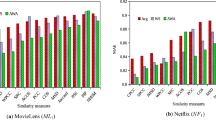Abstract
Neighborhood-based Collaborative Filtering (CF) is one of the most successful and widely used recommendation approaches; however, it suffers from major flaws especially under sparse environments. Traditional similarity measures used by neighborhood-based CF to find similar users or items are not suitable in sparse datasets. Sparse Subspace Clustering and common liking rate in CF (SCCF), a recently published research, proposed a tunable similarity measure oriented towards sparse datasets; however, its performance can be maximized and requires further analysis and investigation. In this paper, we propose and evaluate the performance of a new tuning mechanism, using the Mean Absolute Error (MAE) and F1-Measure metrics, in order to show that the SCCF similarity can be radically enhanced and thus increasing its overall efficiency. Moreover, the SCCF similarity measure was tested against several other measures, targeted especially at sparse datasets, and the results show how the effectiveness of a measure significantly varies with the dataset structure and properties, and that one measure cannot be considered as better than the other when compared with a small selection of other measures.
Access this chapter
Tax calculation will be finalised at checkout
Purchases are for personal use only
Similar content being viewed by others
References
Ricci, F., Rokach, L., Shapira, B.: Recommender Systems Handbook, pp. 131–132. Springer, Boston (2011). https://doi.org/10.1007/978-0-387-85820-3
Schein, A., Popescul, A., Ungar, L., Pennock, D.: Methods and Metrics for Cold-Start Recommendations. SIGIR Forum (ACM Special Interest Group on Information Retrieval), pp. 253–260 (2002). https://doi.org/10.1145/564376.564421
Yildirim, H., Krishnamoorthy, M.: A random walk method for alleviating the sparsity problem in collaborative filtering. In: Proceedings of the 2008 ACM Conference on Recommender System RecSys08, pp. 131–138 (2008). https://doi.org/10.1145/1454008.1454031
Schwarz, M., Lobur, M., Stekh, Y.: Analysis of the effectiveness of similarity measures for recommender systems, pp. 275–277 (2017). https://doi.org/10.1109/CADSM.2017.7916133
Yubo, H., Ya, T., Sijie, W.: A collaborative filtering recommendation based on user trust and common liking rate. 186–190 (2018). https://doi.org/10.1145/3193025.3193038
Elhamifar, E., Vidal, R.: Sparse subspace clustering: algorithm, theory, and applications. IEEE Trans. Pattern Anal. Mach. Intell. 35 (2013). https://doi.org/10.1109/TPAMI.2013.57
Suryakant, Mahara, T., Kant, S.: A new similarity measure based on mean measure of divergence for collaborative filtering in sparse environment. Procedia Comput. Sci. 89, 450–456 (2016). https://doi.org/10.1016/j.procs.2016.06.099
Schröder, G., Thiele, M., Lehner, W.: Setting Goals and Choosing Metrics for Recommender System Evaluations, p. 811 (2011)
Guo, G., Zhang, J., Thalmann, D., Yorke-Smith, N.: ETAF: An extended trust antecedents framework for trust prediction, pp. 540–547 (2014). https://doi.org/10.1109/ASONAM.2014.6921639
Harper, F.M., Konstan, J.: The movielens datasets: history and context. ACM Trans. Interact. Intell. Syst. (TiiS) (2015). https://doi.org/10.1145/2827872
Author information
Authors and Affiliations
Corresponding author
Editor information
Editors and Affiliations
Rights and permissions
Copyright information
© 2019 Springer Nature Switzerland AG
About this paper
Cite this paper
Al Jurdi, W., Jaoude, C.A., Badran, M.E.K., Abdo, J.B., Demerjian, J., Makhoul, A. (2019). SCCF Parameter and Similarity Measure Optimization and Evaluation. In: Douligeris, C., Karagiannis, D., Apostolou, D. (eds) Knowledge Science, Engineering and Management. KSEM 2019. Lecture Notes in Computer Science(), vol 11775. Springer, Cham. https://doi.org/10.1007/978-3-030-29551-6_11
Download citation
DOI: https://doi.org/10.1007/978-3-030-29551-6_11
Published:
Publisher Name: Springer, Cham
Print ISBN: 978-3-030-29550-9
Online ISBN: 978-3-030-29551-6
eBook Packages: Computer ScienceComputer Science (R0)





